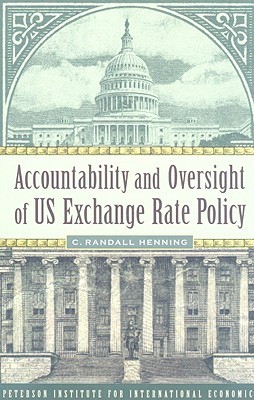
- We will send in 10–14 business days.
- Author: C Randall Henning
- Publisher: Peterson Institute for International Economics
- ISBN-10: 0881324191
- ISBN-13: 9780881324198
- Format: 15.2 x 22.8 x 0.9 cm, minkšti viršeliai
- Language: English
- SAVE -10% with code: EXTRA
Accountability and Oversight of US Exchange Rate Policy (e-book) (used book) | bookbook.eu
Reviews
Description
The dispute over Chinese exchange rate policy within the United States has generated a series of legislative proposals to restrict the discretion of the US Treasury Department in determining currency manipulation and to reform the department's accountability to the Congress. This study reviews the Treasury's reports to the Congress on exchange rate policy--introduced by the 1988 trade act--and Congress's treatment of them. It finds that the accountability process has often not worked well in practice: The coverage of the reports has sometimes been incomplete and not provided a sufficient basis for congressional oversight. Nor has Congress always performed its own role well, holding hearings on less than half of the reports and overlooking important substantive issues. Several recommendations can improve guidance to the Treasury, standards for assessment, and congressional oversight. These include (1) refining the criteria used to determine currency manipulation and writing them into law; (2) explicitly harnessing US decisions on manipulation to the IMF's rules on exchange rates; (3) clarifying the general objectives of US exchange rate policy; (4) reaffirming the mandate to seek international macroeconomic and currency cooperation; and (5) institutionalizing multicommittee oversight of exchange rate policy by Congress. As they develop legislation targeting manipulation, furthermore, legislators should not lose sight of the broader purposes of the 1988 act relating to the effective valuation of the dollar, the current account, and their ramifications for the US economy overall.
EXTRA 10 % discount with code: EXTRA
The promotion ends in 21d.02:18:19
The discount code is valid when purchasing from 10 €. Discounts do not stack.
- Author: C Randall Henning
- Publisher: Peterson Institute for International Economics
- ISBN-10: 0881324191
- ISBN-13: 9780881324198
- Format: 15.2 x 22.8 x 0.9 cm, minkšti viršeliai
- Language: English English
The dispute over Chinese exchange rate policy within the United States has generated a series of legislative proposals to restrict the discretion of the US Treasury Department in determining currency manipulation and to reform the department's accountability to the Congress. This study reviews the Treasury's reports to the Congress on exchange rate policy--introduced by the 1988 trade act--and Congress's treatment of them. It finds that the accountability process has often not worked well in practice: The coverage of the reports has sometimes been incomplete and not provided a sufficient basis for congressional oversight. Nor has Congress always performed its own role well, holding hearings on less than half of the reports and overlooking important substantive issues. Several recommendations can improve guidance to the Treasury, standards for assessment, and congressional oversight. These include (1) refining the criteria used to determine currency manipulation and writing them into law; (2) explicitly harnessing US decisions on manipulation to the IMF's rules on exchange rates; (3) clarifying the general objectives of US exchange rate policy; (4) reaffirming the mandate to seek international macroeconomic and currency cooperation; and (5) institutionalizing multicommittee oversight of exchange rate policy by Congress. As they develop legislation targeting manipulation, furthermore, legislators should not lose sight of the broader purposes of the 1988 act relating to the effective valuation of the dollar, the current account, and their ramifications for the US economy overall.


Reviews